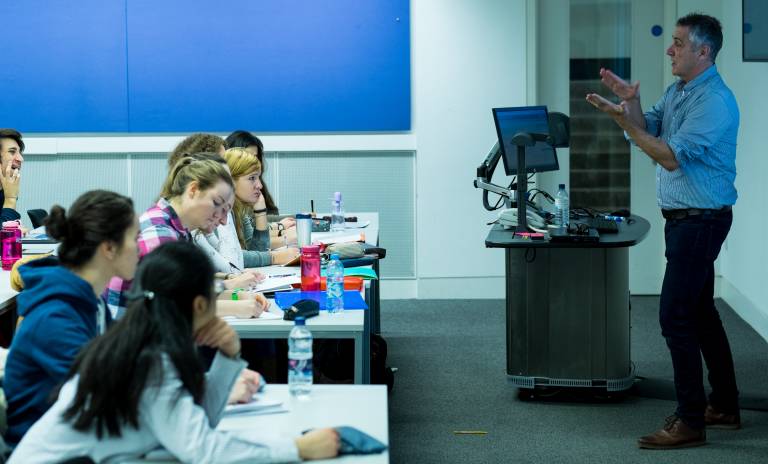
Overview
The two year MPhil Linguistics is the first Research Masters degree in the UK with the specific aim of training students to a level where they can produce impactful research in theoretical linguistics. The programme is provided through a combination of research seminars, auditing of modules, a comprehensive range of research methods development and supervisions for the main research project.
The programme is ideal for students who want to do further research in Linguistics over and above their undergraduate or Masters degree – but may feel unprepared for applying directly to a PhD or are not ready to commit to studying for a full PhD. Completing the MPhil programme will enhance your chances of being successful in applying for PhD positions.
Why study this degree?
The UCL Linguistics research department is known internationally for its outstanding work in all areas of theoretical linguistics and for its growing strength in experimental work. Our staff carry out research aimed at discovering the nature and origin of the principles and representations that characterise human language, its acquisition by children, its neural basis in the brain, and its use in communication. We encourage and facilitate cross-disciplinary interaction with psychologists, cognitive scientists and philosophers working on language and communication both at UCL and elsewhere. Undertaking a research degree in this department means you will be supervised by scholars who are leaders in their field with the expert up-to-date knowledge needed to guide you in shaping your own original research contribution.
Entry Requirements
Either a first-class UK Bachelor's degree in Linguistics; or a taught Masters degree in Linguistics with at least a Merit pass. Overseas qualifications of equivalent standard will also be considered.
Students who are not a national of a UK Home Office majority English speaking country, are required to provide recent evidence regarding their command of spoken and written English at a 'Good' level (IELTS level 7 or equivalent). Here you can find further information on UCL's requirements for English language proficiency.
All applicants must submit a sample of their work with their application and a short statement outlining their area of research interest.
Programme Structure
In year one students will be expected to attend a Graduate Research Seminar in one of the following subjects: Phonology, Syntax, Semantics or Pragmatics. Students will also audit a statistics module at either Introductory, Intermediate or Advanced level – depending on the their ability.
A selection of masters level elective modules will be offered by the department for MPhil students to audit, including lab modules and we reccommend that students select two of these elective modules.
Students will be assigned to a Supervisory Committee when they start the programme (whose constitution may change over the two years, depending on how student interests develop); Twice per term, students will meet a committee member for a supervision session and to discuss a piece of written work.
Students will be expected to have completed a dissertation project proposal and a research plan by the end of their first year on the programme.
In year two students will be asked to continue to take one of the Graduate Research Seminars, engage in regular supervision for their research project and submit a final dissertation of 20,000 words. Students will also be reccommended to audit a further two elective modules from a selection of courses offered by the department.
Research Project Areas
The MPhil programme is based around specialist Research Seminars in the core areas of theoretical linguistics research: syntax, semantics, pragmatics, and phonology.
- Phonology: relation between phonological representations and the speech signal; syllable typology; phonological variation and change
- Semantics: ; formal semantics and pragmatics; foundations of communication;
- Pragmatics: philosophy of language; the semantics/pragmatics interface; Relevance Theory; figurative language; foundations of communication
- Syntax: ellipsis, word order typology, syntax of phi-features, syntax-semantics interface, syntax-morphology interface; syntactic and morphological deficits in aphasia and other syndromes; (research is carried out in a broadly Chomskyan framework).
General Careers and Employability
MPhil Linguistics is ideal for those who want to do linguistic research beyond their undergraduate or Masters degree. Completing the MPhil programme enhances their chances of being successful in applying for PhD positions. Furthermore, this MPhil degree can satisfy the requirements of the MPhil phase of the PhD programme in Linguistics at UCL, allowing one to obtain a PhD in two years (minimum).
The range of modules that students on the MPhil Linguistics can audit is unmatched by other linguistics programmes in the UK. This ensures that our students who enter doctoral work do so with a deep general understanding of the discipline. Together with generic training opportunities available within the Division of Psychology and Language Sciences for statistics and other research methods, we have the most comprehensive training offered for the field. Students also receive training in transferable presentational skills, interview practice and teaching methods.
For careers outside of academia, the combination of analytical and quantitative methods skills possessed by Linguistics research graduates provide the basis to progress to high-level positions including management consultancy, IT, and government.
Networking
The opportunities for networking are vast. Academic staff are members of the Linguistics Association of Great Britain, and some have been involved in running it. The department regularly hosts academic conferences, and is part of the ACTL consortium, which offers additional training in theoretical linguistics. It also offers seminars by eminent international linguists. Completion of a research degree with us will give you excellent credentials for entry into the competitive PhD degree programmes in linguistics.
 Close
Close

